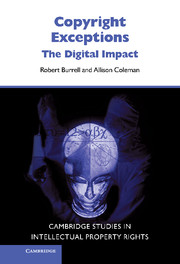Book contents
- Frontmatter
- Contents
- Preface
- List of abbreviations
- Table of cases
- Table of statutes
- Introduction
- Part I Where we are
- 1 Copyright and freedom of expression
- 2 Fair dealing for the purposes of criticism, review and news reporting and related exceptions
- 3 The public interest defence
- 4 Exceptions applying to education, research and private study
- 5 The library and archive provisions and related exceptions
- Part II How we got here
- Part III Where we go from here
- Appendices
- Copyright, Designs and Patents Act 1988, Part I, Chapter III: ‘Permitted Acts’
- Copyright, Designs and Patents Act 1988, s. 296ZE and Schedule 5A
- Directive 2001/29/EC of the European Parliament and of the Council of 22 May 2001 on the harmonisation of certain aspects of copyright and related rights in the information society
- United States Copyright Act 1976, 17 USC, s. 107
- Bibliography
- Index
- Cambridge Studies in Intellectual Property
1 - Copyright and freedom of expression
Published online by Cambridge University Press: 04 March 2010
- Frontmatter
- Contents
- Preface
- List of abbreviations
- Table of cases
- Table of statutes
- Introduction
- Part I Where we are
- 1 Copyright and freedom of expression
- 2 Fair dealing for the purposes of criticism, review and news reporting and related exceptions
- 3 The public interest defence
- 4 Exceptions applying to education, research and private study
- 5 The library and archive provisions and related exceptions
- Part II How we got here
- Part III Where we go from here
- Appendices
- Copyright, Designs and Patents Act 1988, Part I, Chapter III: ‘Permitted Acts’
- Copyright, Designs and Patents Act 1988, s. 296ZE and Schedule 5A
- Directive 2001/29/EC of the European Parliament and of the Council of 22 May 2001 on the harmonisation of certain aspects of copyright and related rights in the information society
- United States Copyright Act 1976, 17 USC, s. 107
- Bibliography
- Index
- Cambridge Studies in Intellectual Property
Summary
We begin our analysis of the exceptions in the United Kingdom by considering those provisions that relate to activities such as criticism, review and news reporting. In the next chapter we provide a detailed analysis of the current provisions that relate to such activities, focusing, in particular, on the section 30 fair dealing exceptions. We argue that the current provisions suffer from a number of serious shortcomings. Before turning to consider the current provisions, however, it is necessary to consider why exceptions covering activities such as criticism, review and news reporting are justified – the limits of the current provisions are only a matter of concern if broader exceptions are warranted. A number of justifications have been offered for such provisions. For example, it has been argued that an exception for ‘reviews’ (in the narrow sense of book reviews, film reviews and the like) can be justified on the economic ground that reviews increase the supply of information to consumers and hence help them to make more informed purchasing decisions. In contrast, although we do not discount other justifications, we seek to demonstrate that rights of criticism, review and so on are necessary to reconcile the potential conflict between copyright and freedom of expression or freedom of information.
In outline, we argue that although the capacity of copyright to interfere with freedom of expression is being increasingly recognised, there has been a tendency amongst judges and commentators alike to downplay the extent of the intersection between the two interests.
- Type
- Chapter
- Information
- Copyright ExceptionsThe Digital Impact, pp. 15 - 41Publisher: Cambridge University PressPrint publication year: 2005

